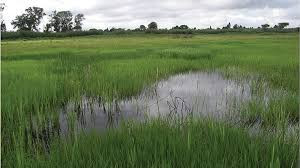
THE opening of the 15th Meeting of the Conference of the Contracting Parties to the Ramsar Convention on Wetlands (COP15) in Victoria Falls marks another significant milestone in global wetland conservation efforts.
While the conference theme "Protecting Wetlands for Our Common Future" sets an ambitious agenda, the stark reality is that wetlands continue to vanish at an alarming rate despite decades of similar gatherings and declarations.
The global statistics are deeply troubling. According to the Ramsar Convention's latest global wetland outlook, the world has lost an astounding 87% of its wetlands since 1700, with the rate of loss tripling since 1970.
Even more alarming, wetlands are disappearing three times faster than forests. In Zimbabwe, the situation has reached crisis proportions, with urban wetlands declining by over 60% since 1990, primarily due to uncontrolled development, agricultural expansion and climate change impacts.
The assault on Zimbabwe's wetlands has been particularly aggressive in urban areas, where land barons and corrupt officials have transformed these ecological treasures into concrete jungles.
The once-pristine wetlands of Harare — Marlborough, Budiriro, Monavale and Borrowdale — now bear the scars of unauthorised construction. Environmental experts estimate that Harare alone has lost more than 70% of its wetlands in the past three decades, a development that threatens not only biodiversity but also the city's water security.
President Emmerson Mnangagwa's words at COP15 resonated with stark truth: "Wetlands are among the most threatened habitats on Earth." Yet, despite such high-level recognition and existing protective legislation, the destruction continues unabated.
The Environmental Management Act, designed to protect these crucial ecosystems, often falls victim to weak enforcement and systemic corruption. Land barons, operating with seeming impunity, have created a parallel system of land allocation that has turned wetland protection into mere paper tigers.
- Byo author eyes SA award
- WB revises downwards Zim growth
- Letters: Zanu PF to blame for anything wrong in Zim
- Shortages show the poverty of ideas in govt
Keep Reading
The economic implications of wetland loss are staggering. These ecosystems provide essential services valued at US$47 trillion annually worldwide, according to recent environmental economic assessments. In Zimbabwe, wetlands support countless livelihoods through fishing, agriculture and tourism. As Eswatini's Prime Minister Russell Dlamini noted at COP15, "We have witnessed tangible benefits from wetland restoration, including the revival of near-extinct plant species, recharged water sources and economic empowerment through handicrafts, weaving and sustainable agriculture."
The cultural significance of wetlands runs deep in African societies. Traditional communities have long recognised these areas as sacred spaces, using indigenous knowledge systems to manage them sustainably. These time-tested practices, which included seasonal restrictions, taboos and community-based management systems, kept wetlands healthy for generations. Today, as we face unprecedented environmental challenges, this ancestral wisdom offers valuable lessons for modern conservation efforts.
The ecological services provided by wetlands are irreplaceable. They act as natural water purifiers, flood controllers and carbon sinks, directly contributing to multiple Sustainable Development Goals. SDG 6 (Clean Water and Sanitation), SDG 13 (Climate Action), SDG 15 (Life on Land) and even SDG 1 (No Poverty) are intrinsically linked to wetland health. As Mnangagwa emphasised, "To neglect wetlands would be to abandon a critical portion of our existence."
The crisis demands a multi-pronged approach. First, enforcement of existing laws must be strengthened, with severe penalties for wetland destruction. Second, urban planning must prioritise wetland protection, incorporating green infrastructure and sustainable development principles. Third, community-based conservation programmes should be established, drawing on both indigenous knowledge and modern scientific methods.
Funding mechanisms for wetland protection need urgent attention. Public-private partnerships, carbon credit schemes and international conservation funds must be mobilised to support restoration efforts. The economic value of intact wetlands far exceeds short-term gains from development, yet this message often gets lost in the rush for quick profits.
Education and awareness are crucial components of any solution. Communities must understand the vital role wetlands play in their lives — from water security to flood protection. Local authorities need training in sustainable urban planning, while developers must be educated about alternative construction methods that preserve wetland function.
Musonda Mumba, secretary-general of the Convention on Wetlands, captured the urgency perfectly: "Let us make this moment where political leadership meets practical action, when commitments become implementation." Zimbabwe's assumption of the COP15 presidency presents a unique opportunity to demonstrate leadership in wetland conservation and set an example for the world.
The integration of traditional knowledge with modern conservation techniques offers a promising path forward. Our ancestors understood the value of wetlands and protected them through sophisticated social and cultural mechanisms. These practices, combined with contemporary scientific methods and proper resource allocation, could provide a robust framework for wetland protection.
The time for action is now. Each day of delay means more wetlands lost, more species threatened and more communities put at risk. The Victoria Falls Declaration must become more than another document — it must catalyse real change on the ground. As Vice-President of Malawi, Michael Usi, reminded delegates, "For over 50 years, the Ramsar Convention has provided the essential global framework for the conservation and wise use of wetlands."
Now is the time to transform this framework into tangible action before these crucial ecosystems are lost forever.
The future of our wetlands — and the communities and species that depend on them — hangs in the balance.
Our wetlands stand at a crossroads.
The path we choose today will determine whether future generations inherit vibrant, living wetlands or merely read about them in history books.
The choice — and the responsibility — is ours.
- Lawrence Makamanzi is an independent researcher and analyst, passionately sharing his insights in a personal capacity. He is reachable at [email protected] or 0784318605.










